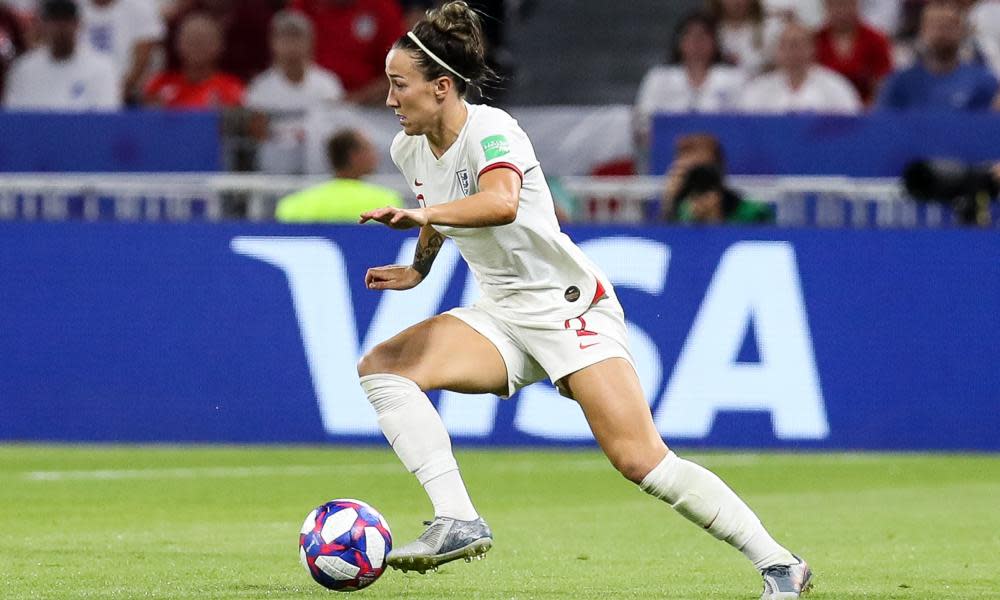Uefa's forward thinking creates great Women's Champions League climax

It would be easy to say Uefa’s decision to allow clubs to register up to six new players for the Women’s Champions League quarter-finals undermines the sporting integrity of the competition.
To be frank, it fundamentally alters the nature of it. Now, it is very much a mini-tournament that has cut ties with what preceded the Covid-19 shutdown; it is a pre-season cup competition, but with a lot more at stake.
Uefa demanded that entrants into the 2020-21 tournament be determined on sporting merit, forcing the Women’s Super League to pick winners and losers from a season with only 72% of games played, and other leagues into a similar situation. Yet for the conclusion of the 2019-20 Champions League it has shifted the goalposts.
Related: Glasgow City's Champions League mountain made steeper by shutdown | Suzanne Wrack
In many ways it makes sense to have this additional flexibility, which also says no more than three players can be registered from other Champions League quarter-finalists.
With the leagues in France, Spain, Scotland and England cut short and Germany’s Frauen Bundesliga concluded in late June following a restart, transfer windows opened. A host of players at the end of their contracts were released and others sold. That, in and of itself, made a mockery of the idea that the continuation of the Champions League could maintain sporting integrity. Teams had fundamentally changed and Uefa needed to take note of that.
What does it mean? Now, instead of teams weakened by outgoings having new signings stuck in the stands, we will see some of the best players and teams in the world battle for Europe’s premier prize.
At one stage Lyon had been looking at a title defence without the out-of-contract England duo Lucy Bronze and Alex Greenwood, goalkeeper Sarah Bouhaddi and influential playmaker Dzsenifer Marozsán – and no Griedge Mbock or Ada Hegerberg because of injury.
Bronze and Greenwood were swiftly retained on two-month deals, and Bouhaddi and Marozsán, who looked to be heading to the US, were given new contracts. Now, though, the reigning champions can also call upon the Australian defender Ellie Carpenter, midfielder Sara Björk Gunnarsdóttir, goalkeeper Lola Gallardo and left-back Sakina Karchaoui.
Arsenal, the only club not to have qualified for next season’s edition, can register the Australian right-back Steph Catley, goalkeeper Lydia Williams, Swiss defender Noëlle Maritz and midfielder Malin Gut. With winning the tournament the team’s last option of securing a place in the 2020-21 tournament, it is a vital boost to their depleted numbers.
Related: Transfers provide a silver lining for WSL and may soon have a Bronze hue
Atlético’s first- and second-choice goalkeepers left after reaching the end of their contracts but the club will not be forced into fielding their third- and fourth-choice players and will have the World Cup finalist Hedvig Lindahl and the former Arsenal keeper Pauline Peyraud-Magnin.
For Glasgow City, the David v Goliath task is made harder by the former Manchester City striker Pauline Bremer and 18-year-old “one to watch” Lena Oberdorf being among four players to have joined the German champions Wolfsburg. The Scottish club have also strengthened, bringing in South Africa’s most-capped player and captain, Janine van Wyk, a defender who has played at two Olympic Games and the 2019 World Cup.
Arsenal’s opponents PSG, Bayern Munich, who face Lyon, and Barcelona, who play Atlético, have recruited heavily.
Until the 18 August deadline for registering tournament players we can expect movement. Clubs may also look to secure short-term loans for players in the US because the NWSL Challenge Cup concludes on 26 July.
What Uefa has done, in not tearing up the rulebook but twisting it a little, is to shift the tournament from limping across the line to being a thrilling unpredictable spectacle that will plug a seven-month hole without women’s football for English clubs.
Games will be played in San Sebastián’s Anoeta stadium and the San Mamés stadium in Bilbao over nine days, concluding on 30 August.
An acceptance of how much the delay caused by the pandemic has affected teams has been recognised. With a bit of forward thinking, Uefa has begun to mould a genuinely exciting tournament. With players not having played competitively for months, friendlies in the build-up in short supply and new signings aplenty, it will be chaos.
Sometimes, though, you’ve just got to embrace the chaos and enjoy the ride.


